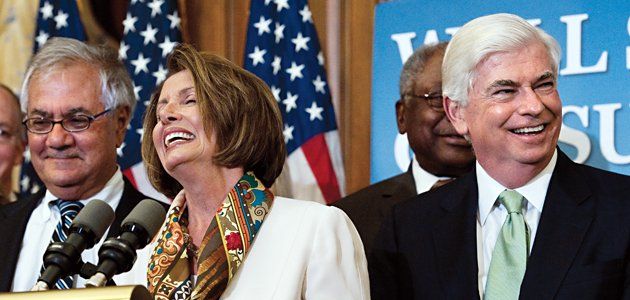
With Wall Street reform added to health care, President Obama is now two-for-two on his major domestic initiatives. If you include big bills expanding college loans and cracking down on credit-card companies (further strengthened in the new Dodd-Frank financial legislation), he's four-for-four. Throw in the Recovery Act, which included more public investment than even Franklin Roosevelt managed in his first year, and a half dozen other meaty bills and you've got a legislative record that's already historic. Oh, and Obama (with Ben Bernanke) prevented another Great Depression, then got almost all the bailout money back.
But no good deed goes unpunished, and the GOP seems headed for a takeover of the House of Representatives in November. (The Senate is out of reach.) When Robert Gibbs said last week the GOP might seize the House, Nancy Pelosi was furious; she thought Gibbs's comment will hurt fundraising. Gibbs was right to say it. Raising the stakes concentrates the mind on the cognitive dissonance of the American voter—and on Obama's own failure to get his act together politically.
Cognitive dissonance is the anxiety caused by an inconsistency between one's beliefs and actions. The beliefs of American voters are clear: they overwhelmingly favor more regulation of Wall Street, which means they simply won't support the repeal of Dodd-Frank that House Minority Leader John Boehner called for before the ink was even dry on the new law. They strongly support the extension of unemployment benefits, now being blocked by Boehner & Co. More than 60 percent, according to a recent Bloomberg survey, oppose Boehner's idea of repealing health-care reform. And you can practically count on one hand the number who agree with Boehner's main man on energy, Joe Barton, that making BP pay to clean up the oil spill and compensate gulf locals was a "shakedown."
So why are so many of these same voters poised to make Boehner the House speaker? Because they aren't rationally aligning belief and action; they're tempted to lose their spleens in the polling place without fully grasping the consequences. With 10 percent unemployment and credit still tight, it's understandable why they aren't as cool, calm, and collected as the president. They don't see the changes yet in their own lives.
And voters rightly sense that financial reform doesn't address the problem of "too big to fail." The Volcker rule, which tried to force banks to give up propriety trading (i.e., gambling), was amended to allow banks to invest up to 3 percent of their assets in hedge funds. With leverage, that's more than $1 trillion in potential exposure. So when the next crisis comes, the government will still be backstopping a gigantic casino, the very outcome Volcker told me last year that he was trying to avoid.
When Obama says the bill means "No more taxpayer-funded bailouts—period," he lessens his credibility. It's true that the new "resolution authority" is a big advance in giving Washington the tools it needs to avert a depression. But winding down the AIGs and Lehmans of the future isn't free. It's just free of meddling from Congress. The Fed will use guarantees and other instruments to create the funds out of thin air, as it did last year.
The bill's creation of a Consumer Financial Protection Bureau is a big step forward. But it requires a kick-ass director like Elizabeth Warren, who has carved out a reputation as a fierce consumer advocate. Some Democrats prefer a more easily confirmable nominee who knows the scams from the inside, like Wall Street veteran and former SEC chairman William Donaldson. But Donaldson, like other SEC chairs, missed Bernie Madoff. And Obama should welcome a big Senate fight over Warren.
Above all, the Obama team needs to get creative. Remember when Al Gore smashed an ashtray on David Letterman's show in 1993 to draw attention to the Clinton-Gore "reinventing government" initiative? Well, maybe Joe Biden could use a Magic Marker to cross out impenetrable loan and credit-card fine print on TV. (You get the idea.) In his speech after the vote last week, Obama once again failed to use vivid metaphors or turns of phrase to imprint the plan on the public consciousness. "But the crisis came" (an echo of "And the war came," from Lincoln's second inaugural) doesn't cut it. So far, Obama has uttered only one memorable political line this year, and it was a good one: "After they [Republicans] drove the car into the ditch, now they want the keys back. No!" If he repeats it 50 times between now and Election Day, maybe the dissonance will dissipate.
Jonathan Alter is also the author of The Promise: President Obama, Year One and The Defining Moment: FDR's Hundred Days and the Triumph of Hope.
Uncommon Knowledge
Newsweek is committed to challenging conventional wisdom and finding connections in the search for common ground.
Newsweek is committed to challenging conventional wisdom and finding connections in the search for common ground.
About the writer
To read how Newsweek uses AI as a newsroom tool, Click here.








